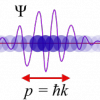-
Posts
4 -
Joined
-
Last visited
Content Type
Profiles
Forums
Events
Posts posted by ldarko29
-
-
But what really causes the collision of these particles from the conservation of energy point of view?
Conservation of energy doesn't cause the collision.
The position of particles with respect to each other determines the forces between them, which may cause them to collide.
What's true is that, of course, energy is conserved in the collision.
0 -
I'm interested in quantum mechanics, so I thought I'd get really familiar with all aspects of 'classical mechanics' first.
Since I'm graduating high school this year, and I intend to study physics at university, it will help for both.
That's why I'm currently reading "Classical Mechanics" by John R. Taylor, which seems like a really good book.
I am trying to find some kind of book that goes from basics (what's a wave, types, diffraction, polarization, etc.), towards describing them with more complex mathematical tools (like partial derivatives, laplacean, etc.).
I'm not familiar with wave equation (where I'm from, we still didn't learn partial differentiation in high school, so we didn't learn any concepts involving them), but I AM familiar with partial derivatives (I taught myself), integreals, and such tools that I see on the wave equation Wikipedia page.
My 'final goal' is to really understand quantum mechanical wavefunction.
0 -
I'm looking for a book or some kind of course on "wave mathematics".
I'm familiar with basics, like wavelength, frequency, amplitude, interferrence and all that, but I want to further improve my understanding of this subject.
0



Mathematical description of waves
in Mathematics
Posted · Edited by ldarko29
Well, I just started reading it, and I can still follow it. However, I'm still at the very basics (Newton's laws derivation etc.), so it'll probably get tougher.
I may just read what the author calls "essentials" -- first chapter of the book.
Thanks, I looked it up, and it seems like a great one.
Many illustrations and problems explained, althought it is 1300 pages long!
I will definitelly need to learn more about differential equations, as I'm only vaguely familiar with them..